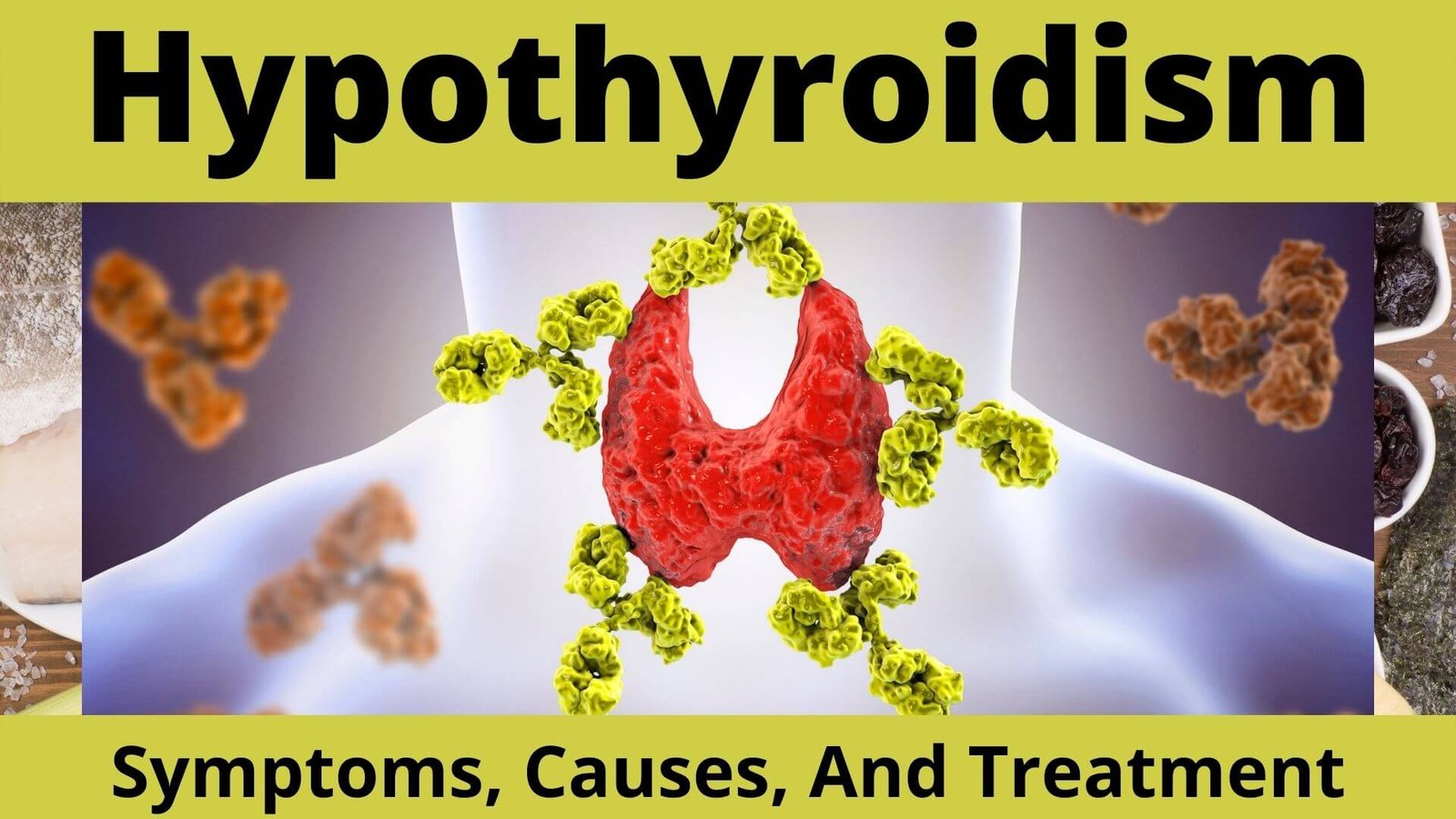What is hypothyroidism?
Hypothyroidism is an endocrine problem caused by a thyroid hormone deficiency. Hypothyroidism is a disease of the thyroids. Therefore, hypothyroidism is a disease of too little thyroid activity. In the early stages, hypothyroidism may not generate visible symptoms. Untreated hypothyroidism can cause several problems, including obesity, joint pain, infertility, and heart disease.
Before starting the topic in detail, we should know about the thyroid.
What is a thyroid?
The thyroid gland is the central part of the endocrine system, including glands that generate, store, and release hormones into circulation so that they may reach the body’s cells. The thyroid gland absorbs iodine from meals to produce two major hormones: Thyroxine (T3) and triiodothyronine (T4).

Causes and Symptoms
CAUSES
When your thyroid doesn’t produce enough hormones, your body’s balance of chemical reactions can be upset. Several factors can contribute to this, including autoimmune illness, hyperthyroidism therapies, radiation therapy, thyroid surgery, and some drugs.
The thyroid gland is a very small, butterfly-shaped gland at the base of your front neck, just below your Adam’s apple. Thyroid hormones, triiodothyronine (T3) and thyroxine (T4), greatly influence your health, impacting many elements of your metabolism. These hormones are also in charge of crucial activities, including body temperature and heart rate.

Hypothyroidism is a disorder that occurs when the thyroid gland fails to produce enough hormones. Hypothyroidism can result from several factors, including:
Autoimmune disease. The most important cause of hypothyroidism is Hashimoto’s autoimmune thyroiditis. You have an autoimmune condition when your immune system makes antibodies that damage your tissues. This procedure can sometimes affect your thyroid gland.
Scientists aren’t sure why this occurs, but it’s most likely due to various variables, including your genes and an environmental trigger. These antibodies, however, impair the thyroid’s capacity to generate hormones.
Over-production of thyroid hormone treatment. Hyperthyroidism (excess thyroid hormone production) is usually treated with radioactive iodine or anti-thyroid medications. The purpose of these medicines is to restore normal thyroid function. However, treating hyperthyroidism can occasionally reduce thyroid hormone production, resulting in lifelong hypothyroidism.
Thyroid surgery. Removing a significant amount of your thyroid gland can reduce or stop hormone production. In such a situation, you’ll have to take thyroid hormone for the rest of your life.
Radiation therapy. Radiation treating head and neck malignancies might harm your thyroid gland and cause hypothyroidism.
Medications. Several medications can contribute to hypothyroidism. One such medication is lithium, used to treat certain psychiatric disorders. If you’re taking medication, ask your doctor about its effect on your thyroid gland.
SYMPTOMS
Because thyroid hormones influence many organ systems, hypothyroidism symptoms are varied. The thyroid gland produces thyroid hormones such as triiodothyronine (T3) and thyroxine (T4).
These regulate metabolism and influence the following functions:

- Breathing exercises for brain growth
- The activities of the heart and nervous system
- Body temperature, muscular strength, and skin hydration
- Menstrual cycles, cholesterol levels in weight
Hypothyroidism symptoms often include, but are not limited to:
- Fatigue, tiredness, weight gain
- Cold intolerance, slowing of heart rate, movements, and speech
- Joint and muscle pain, cramping, and weakness
- Constipation
- Brittle fingernails, dry skin, and scant hair
- Decreased perspiration, pins and needles, and feelings
- Menorrhagia (heavy periods)
- Weakness
- Enlarged face, feet, and hands as a result of high cholesterol
- Insomnia
- Balance and coordination issues
- Reduction in libido
- Recurrent urinary tract infections and anemia of the respiratory tract
- Depression
If untreated, the following symptoms may appear:
- Hoarseness
- Facial puffiness thinning or absent brows
- Heart rate reduction
- Loss of hearing
When it affects adolescents or teenagers, the indications and symptoms are similar to those seen in adults. However, they may also encounter:
- Development is slow
- Delayed tooth development
- A lack of mental growth
- Delayed puberty
Hypothyroidism develops gradually. Symptoms that are vague and nonspecific may go undiagnosed for an extended period. Symptoms vary significantly across individuals, and different illnesses share them. A blood test is the only method to get a definitive diagnosis.
DIET
There is no special diet for hypothyroidism, but patients should eat a varied, well-balanced diet low in fat and salt. Furthermore, patients suffering from Hashimoto’s thyroiditis may benefit from a gluten-free diet. Research shows a relationship between celiac disease and autoimmune thyroid illness; both have inflammatory components. Avoiding gluten may help with non celiac autoimmune disorders, but speaking to a doctor before cutting out foods containing gluten is essential. Other foods and minerals can be harmful, especially in large quantities.
These include soya, which can interfere with thyroxine absorption. Iodine, which is present in kelp and other seaweeds, supplements, specific multivitamins, and iron supplements, can interfere with thyroxine absorption. Cruciferous foods, such as cauliflower and cabbage, may cause goiter, but only in large quantities.
Consuming more iodine may disrupt the balance involved in therapy. Iodine can be dangerous if hyperthyroidism develops. Should review Any dietary or supplement modifications with a doctor.
TREATMENT
The therapeutic aims for hypothyroidism are to reverse clinical progression and rectify metabolic derangements, as demonstrated by normal TSH and free thyroxine levels in the blood (T4). The thyroid hormone is given to complement or replace the body’s production. A steady daily dosage of levothyroxine can effectively cure hypothyroidism (LT4). Thyroid hormone can introduce at entire replacement dosages in young, otherwise healthy people. The dose will determine the severity of the hypothyroidism and how the patient’s body responds to therapy.
In most circumstances, a doctor will suggest a dose of 1.6 micrograms per kilogram trustworthy source of body weight daily. However, may adjust this if a person needs less or more. Individuals suffering from subclinical hypothyroidism may opt to treat it, but they will require minimal therapeutic dosages. Secondary hypothyroidism may necessitate medication to address the underlying problem affecting the hypothalamus or pituitary gland.
Related Conditions and diseases:









Add comment